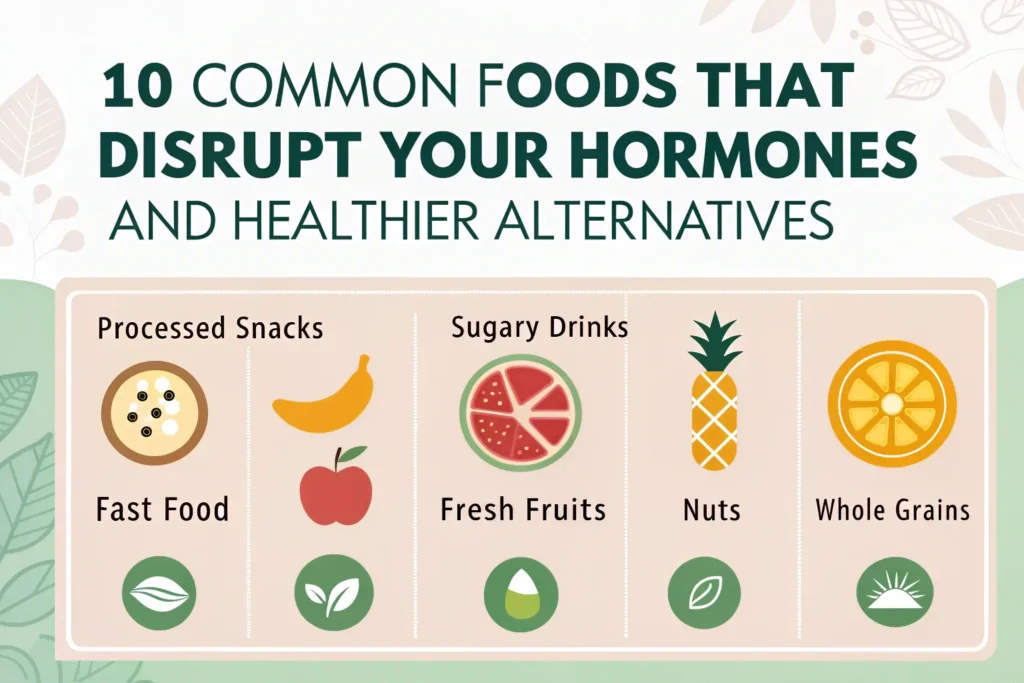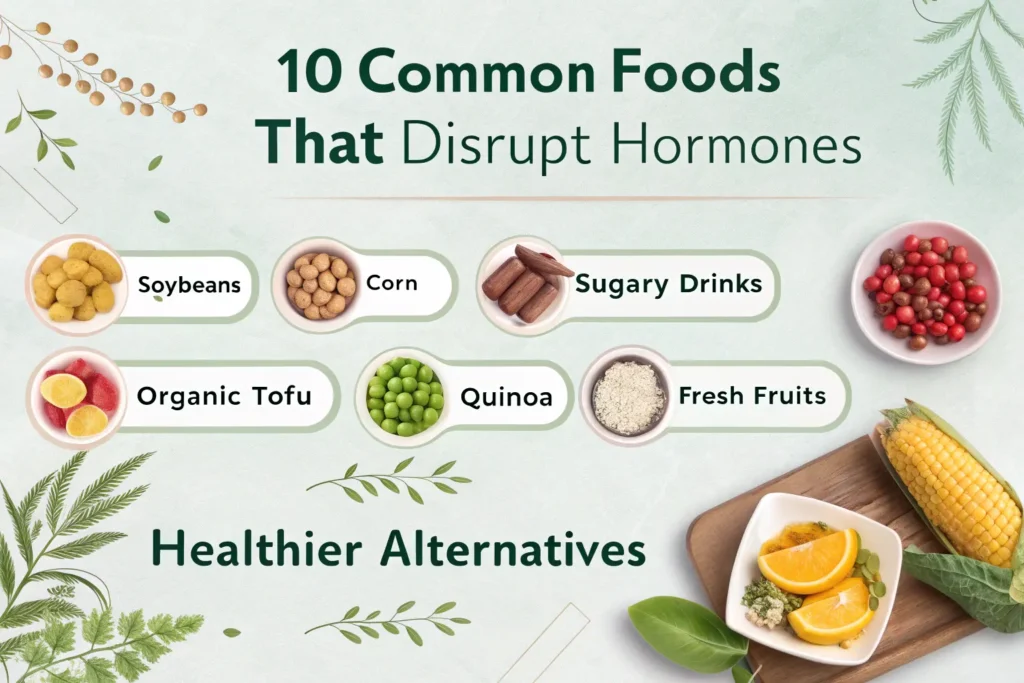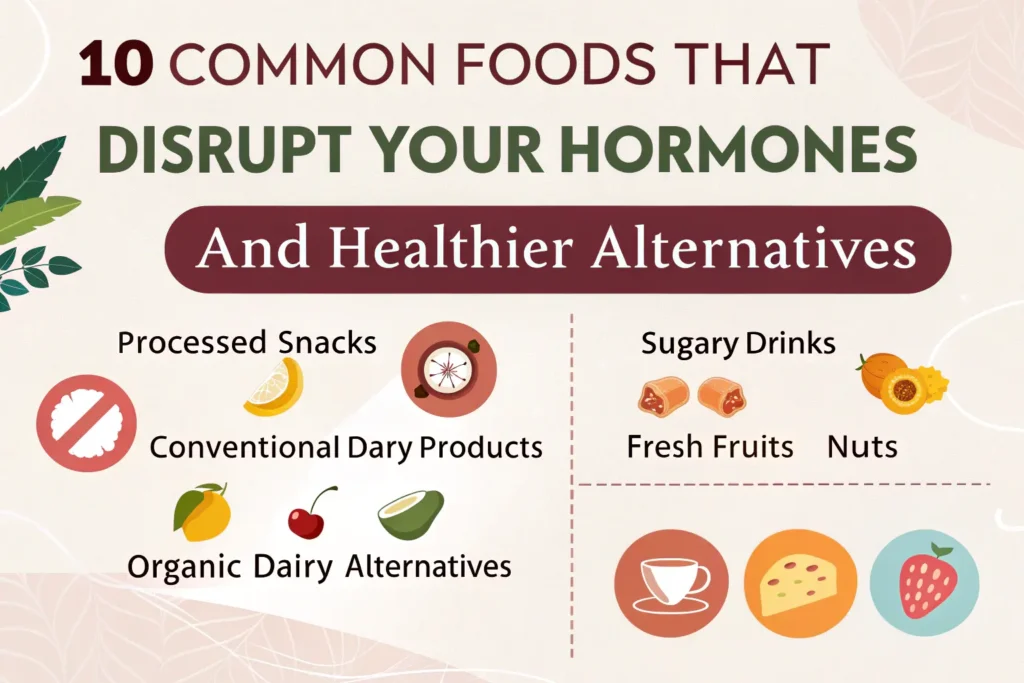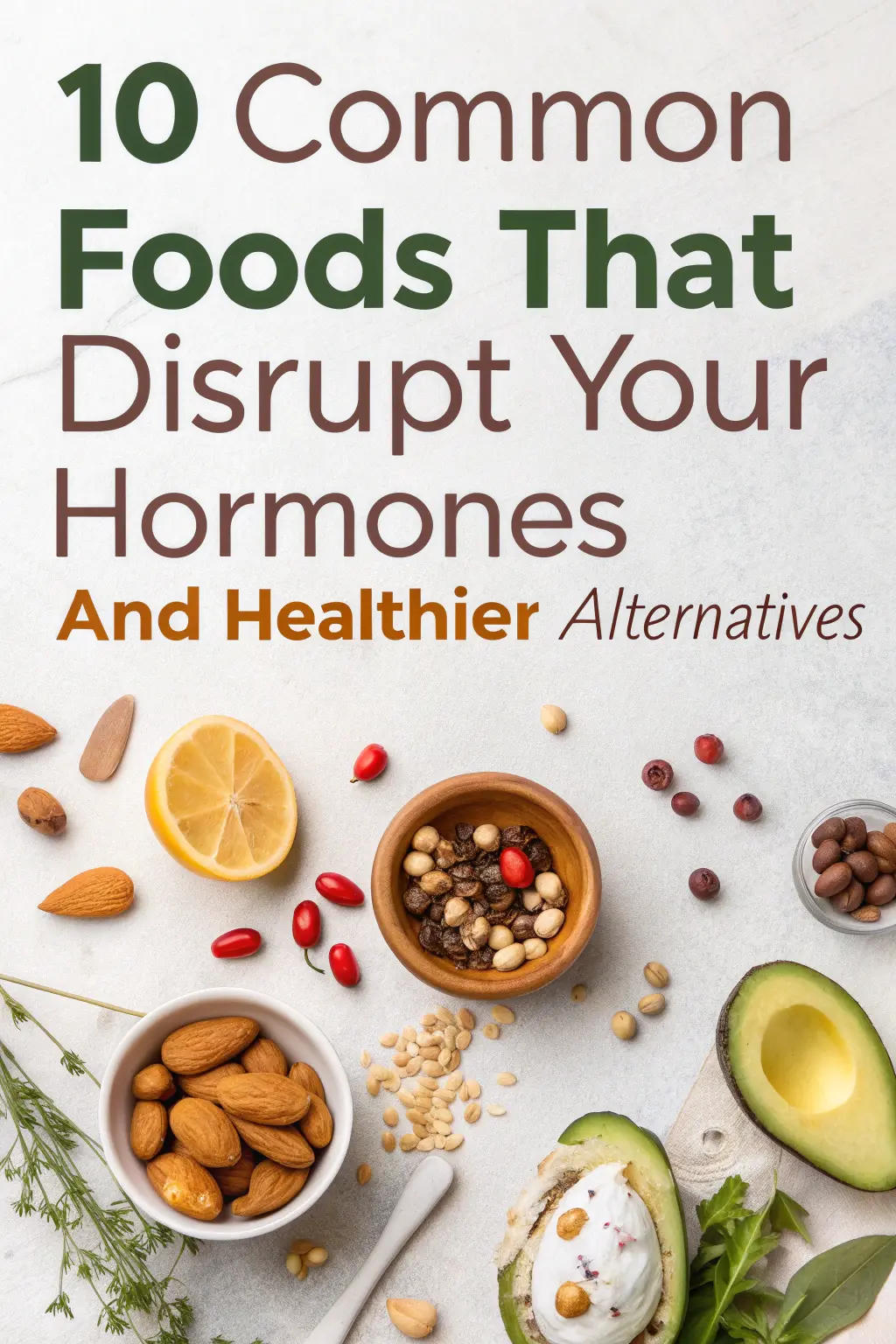Your hormones are powerful chemical messengers that regulate everything from your mood and energy levels to your weight, sleep, and reproductive health. When these delicate systems are disrupted, you might experience symptoms like unexplained weight gain, mood swings, irregular periods, low energy, or difficulty sleeping.
While stress, lack of sleep, and environmental toxins all play a role in hormonal imbalance, one of the most significant yet overlooked factors is what’s on your plate. Certain foods can interfere with hormone production, metabolism, and function, creating a cascade of health issues that many people struggle with for years without realizing the connection.
The good news? By identifying and replacing hormone-disrupting foods with healthier alternatives, you can support your body’s natural hormone balance and start feeling more like yourself again. Let’s explore the most common culprits hiding in your kitchen and discover delicious, hormone-friendly swaps that will nourish your endocrine system.
Table of Contents

Understanding Hormone Disruption Through Food
Before diving into specific foods, it’s important to understand how diet affects hormones. Foods can disrupt hormonal balance through several mechanisms:
Blood Sugar Spikes: Foods that cause rapid rises in blood glucose trigger insulin spikes, which can lead to insulin resistance and affect other hormones like cortisol and sex hormones.
Inflammatory Response: Certain foods trigger chronic inflammation, which interferes with hormone receptors and disrupts normal hormone signaling.
Liver Overload: The liver is responsible for metabolizing and detoxifying hormones. Foods that burden the liver can impair its ability to clear excess hormones from the body.
Gut Microbiome Disruption: An unhealthy gut microbiome can affect hormone production and metabolism, particularly estrogen metabolism.
Direct Hormone Mimicry: Some foods contain compounds that can mimic or block natural hormones in the body.
1. Refined Sugar and High-Fructose Corn Syrup
The Problem
Refined sugar and high-fructose corn syrup cause rapid spikes in blood glucose and insulin levels. Over time, this can lead to insulin resistance, increased cortisol production, and disrupted leptin signaling (the hormone that tells you when you’re full). These sweeteners are hidden in countless processed foods, from sodas and candy to salad dressings and bread.
How It Disrupts Hormones
- Creates insulin resistance, affecting metabolism and weight management
- Elevates cortisol levels, leading to stress-related hormone imbalances
- Disrupts leptin and ghrelin, the hormones that regulate hunger and satiety
- Contributes to inflammation throughout the body
Healthier Alternatives
- Fresh fruits: Provide natural sweetness plus fiber, vitamins, and antioxidants
- Raw honey: Contains enzymes and has a lower glycemic impact when used in moderation
- Pure maple syrup: Rich in minerals and has a more gradual effect on blood sugar
- Stevia: A natural, zero-calorie sweetener that doesn’t affect blood glucose
- Dates: Can be used in baking and provide fiber and potassium
Practical Swaps
- Replace soda with sparkling water infused with fresh fruit
- Use mashed banana or applesauce in baking instead of refined sugar
- Choose unsweetened versions of yogurt, almond milk, and other products
- Make homemade salad dressings using olive oil, vinegar, and herbs
2. Processed Soy Products
The Problem
While whole, fermented soy products like tempeh and miso can be beneficial, heavily processed soy foods (soy protein isolate, soy milk, veggie burgers) contain high levels of isoflavones that can mimic estrogen in the body. Most commercial soy is also genetically modified and treated with pesticides.
How It Disrupts Hormones
- Phytoestrogens can interfere with natural estrogen production and metabolism
- May affect thyroid function by interfering with iodine absorption
- Can disrupt the balance between estrogen and progesterone
- Processed forms often contain other hormone-disrupting additives
Healthier Alternatives
- Fermented soy products: Tempeh, miso, natto (in moderation)
- Hemp seeds: Provide complete protein and healthy fats
- Pumpkin seeds: Rich in zinc, which supports hormone production
- Lentils and beans: Excellent plant-based protein sources
- Quinoa: Complete protein grain alternative
Practical Swaps
- Replace soy milk with unsweetened almond, coconut, or oat milk
- Use lentils or black beans instead of soy-based meat substitutes
- Choose coconut aminos instead of soy sauce
- Snack on pumpkin seeds instead of processed soy snacks
3. Conventional Dairy Products
The Problem
Conventional dairy products often contain hormones (rBGH, rBST) given to cows to increase milk production. These synthetic hormones can disrupt your natural hormone balance. Additionally, many people have sensitivities to dairy proteins and lactose, which can trigger inflammation and affect hormone metabolism.
How It Disrupts Hormones
- Contains artificial growth hormones that can interfere with human hormones
- May increase insulin-like growth factor (IGF-1) levels
- Can trigger inflammatory responses that affect hormone signaling
- Lactose intolerance can cause digestive issues that impact overall health
Healthier Alternatives
- Organic, grass-fed dairy: If you tolerate dairy, choose hormone-free options
- Coconut milk: Rich in healthy fats and naturally dairy-free
- Almond milk: Low in calories and fortified with nutrients
- Cashew cheese: Creamy alternative for cheese lovers
- Goat milk products: Often easier to digest than cow’s milk
Practical Swaps
- Use coconut milk in smoothies and cereal
- Try cashew or almond-based cheese alternatives
- Make overnight oats with oat milk instead of regular milk
- Use coconut yogurt topped with fresh berries
4. Refined Vegetable Oils
The Problem
Highly processed vegetable oils like soybean, corn, and canola oil are high in omega-6 fatty acids and often contain trans fats. These oils are inflammatory and can disrupt the delicate balance of hormones, particularly those involved in inflammation and stress response.
How It Disrupts Hormones
- Creates an imbalance between omega-3 and omega-6 fatty acids
- Promotes inflammation, which interferes with hormone receptors
- May contain trans fats that disrupt cell membrane function
- Can increase cortisol production due to inflammatory effects
Healthier Alternatives
- Extra virgin olive oil: Rich in antioxidants and healthy monounsaturated fats
- Coconut oil: Stable at high temperatures and contains beneficial MCTs
- Avocado oil: High smoke point, perfect for cooking
- Grass-fed butter: Contains beneficial fatty acids and fat-soluble vitamins
- Ghee: Clarified butter that’s easier to digest
Practical Swaps
- Use olive oil for salad dressings and low-heat cooking
- Cook with coconut oil or avocado oil at higher temperatures
- Choose foods cooked in healthier oils when dining out
- Read labels carefully to avoid foods containing processed vegetable oils

5. Caffeine (In Excess)
The Problem
While moderate caffeine consumption can have benefits, excessive intake from coffee, energy drinks, and sodas can overstimulate the adrenal glands and disrupt cortisol patterns. This is particularly problematic for people already dealing with stress or adrenal fatigue.
How It Disrupts Hormones
- Stimulates cortisol production, especially when consumed later in the day
- Can interfere with sleep quality, affecting growth hormone and recovery
- May increase anxiety and stress hormone levels
- Can affect blood sugar regulation
Healthier Alternatives
- Green tea: Contains L-theanine, which promotes calm alertness
- Matcha: Provides sustained energy without the crash
- Herbal teas: Chamomile, peppermint, and rooibos are naturally caffeine-free
- Golden milk: Turmeric latte with anti-inflammatory properties
- Adaptogenic drinks: Contain herbs that help the body manage stress
Practical Swaps
- Limit coffee to 1-2 cups before 2 PM
- Replace afternoon coffee with green tea or herbal tea
- Try adaptogenic coffee blends that include stress-supporting herbs
- Gradually reduce caffeine intake to avoid withdrawal symptoms
6. Alcohol
The Problem
Alcohol disrupts hormone balance in multiple ways. It interferes with the liver’s ability to metabolize hormones, particularly estrogen, and can affect sleep quality, which is crucial for hormone production and regulation.
How It Disrupts Hormones
- Impairs liver function, affecting hormone metabolism
- Disrupts sleep patterns, reducing growth hormone production
- Can increase estrogen levels by interfering with estrogen clearance
- Affects blood sugar regulation and insulin sensitivity
- May lower testosterone levels in both men and women
Healthier Alternatives
- Mocktails: Creative alcohol-free cocktails with fresh ingredients
- Kombucha: Fermented tea with beneficial probiotics
- Sparkling water with herbs: Refreshing and hydrating
- Herbal elixirs: Adaptogenic drinks that support hormone balance
- Fresh fruit and herb waters: Natural flavoring without alcohol
Practical Swaps
- Enjoy alcohol in moderation (1 drink per day for women, 2 for men)
- Choose organic, sulfite-free wines when you do drink
- Alternate alcoholic drinks with water
- Try “dry” periods to give your liver a break
7. Processed and Packaged Foods
The Problem
Processed foods are loaded with preservatives, artificial flavors, colors, and chemicals that can act as endocrine disruptors. They’re also typically high in refined sugars, unhealthy fats, and sodium while being low in nutrients needed for hormone production.
How It Disrupts Hormones
- Contains chemical additives that can mimic or block hormones
- Often high in sugar and unhealthy fats that promote inflammation
- Lacks nutrients needed for hormone synthesis
- May contain BPA and other endocrine-disrupting chemicals from packaging
Healthier Alternatives
- Whole foods: Fresh fruits, vegetables, lean proteins, and whole grains
- Homemade meals: Control ingredients and avoid additives
- Minimally processed foods: Choose items with short, recognizable ingredient lists
- Organic options: When possible, to avoid pesticide residues
- Fresh herbs and spices: Natural flavoring without artificial additives
Practical Swaps
- Meal prep on weekends to avoid processed convenience foods
- Choose whole fruits instead of fruit snacks or dried fruits with added sugar
- Make homemade versions of favorite processed foods
- Read ingredient labels and avoid items with long lists of chemicals
8. Farmed Fish
The Problem
Conventionally farmed fish often contains antibiotics, synthetic hormones, and artificial coloring. These fish are typically fed unnatural diets and raised in crowded conditions that require chemical interventions to prevent disease.
How It Disrupts Hormones
- May contain synthetic hormones used to promote growth
- Often contaminated with antibiotics that can affect gut health
- Higher levels of inflammatory omega-6 fatty acids compared to wild fish
- May contain environmental toxins concentrated in fish tissues
Healthier Alternatives
- Wild-caught fish: Salmon, sardines, mackerel, and anchovies
- Sustainable seafood: Look for certifications from reputable organizations
- Small fish: Generally have lower toxin levels than large predatory fish
- Plant-based omega-3 sources: Flaxseeds, chia seeds, and walnuts
- Algae-based supplements: For omega-3s without the fish
Practical Swaps
- Choose wild-caught salmon over farmed salmon
- Eat smaller fish like sardines and anchovies more frequently
- Use sustainable seafood guides when shopping
- Include plant-based omega-3 sources in your diet regularly
9. Conventional Meat and Poultry
The Problem
Conventionally raised meat and poultry often comes from animals given growth hormones, antibiotics, and fed unnatural diets. These substances can accumulate in animal tissues and potentially affect human hormone levels when consumed.
How It Disrupts Hormones
- May contain synthetic growth hormones like rBGH
- Antibiotics can disrupt gut microbiome, affecting hormone metabolism
- Often higher in inflammatory omega-6 fatty acids
- May contain pesticide residues from animal feed
Healthier Alternatives
- Grass-fed beef: Higher in omega-3s and free from hormones
- Pasture-raised poultry: Chickens raised on natural diets
- Organic meat: Certified free from hormones and antibiotics
- Wild game: Naturally lean and hormone-free
- Plant-based proteins: Legumes, nuts, and seeds
Practical Swaps
- Choose grass-fed, organic meat when possible
- Reduce overall meat consumption and increase plant proteins
- Look for “no antibiotics” and “no hormones” labels
- Consider joining a local CSA or buying directly from farmers
10. Gluten-Containing Grains (For Sensitive Individuals)
The Problem
While not everyone needs to avoid gluten, those with celiac disease, non-celiac gluten sensitivity, or autoimmune conditions may find that gluten triggers inflammation that can disrupt hormone balance. Additionally, many gluten-containing products are highly processed.
How It Disrupts Hormones
- Can trigger inflammatory responses in sensitive individuals
- May interfere with nutrient absorption needed for hormone production
- Often found in processed foods high in sugar and unhealthy fats
- Can affect gut health, which is crucial for hormone metabolism
Healthier Alternatives
- Quinoa: Complete protein and naturally gluten-free
- Brown rice: Whole grain option with fiber and nutrients
- Oats: Naturally gluten-free (choose certified gluten-free brands)
- Sweet potatoes: Nutritious carbohydrate source
- Cauliflower rice: Low-carb alternative to grain-based dishes
Practical Swaps
- Use quinoa or brown rice instead of wheat-based grains
- Try zucchini noodles or spaghetti squash instead of pasta
- Choose gluten-free oats for breakfast
- Experiment with grain-free baking using almond or coconut flour

Creating a Hormone-Friendly Kitchen
Stock Your Pantry With:
- Organic coconut oil and olive oil
- Raw nuts and seeds
- Quinoa, brown rice, and gluten-free oats
- Organic herbs and spices
- Raw honey and pure maple syrup
- Herbal teas and green tea
Fill Your Fridge With:
- Organic vegetables and fruits
- Grass-fed meat and pasture-raised eggs
- Wild-caught fish
- Fermented foods like sauerkraut and kimchi
- Organic dairy or plant-based alternatives
- Fresh herbs
Meal Planning Tips:
- Plan balanced meals with protein, healthy fats, and complex carbohydrates
- Prep vegetables and proteins on weekends
- Keep healthy snacks readily available
- Experiment with new recipes using hormone-friendly ingredients
The Transition: Making Changes Gradually
Start Small
Don’t try to eliminate everything at once. Choose 2-3 foods to focus on initially and gradually expand your efforts.
Focus on Addition Before Subtraction
Instead of focusing on what you can’t eat, emphasize adding nutrient-dense, hormone-supporting foods to your diet.
Listen to Your Body
Pay attention to how different foods make you feel. Keep a food and symptom journal to identify patterns.
Be Patient
Hormone balance doesn’t happen overnight. Give your body time to adjust and heal with consistent dietary changes.
Beyond Diet: Supporting Hormonal Health
While diet plays a crucial role in hormone balance, remember that other factors also matter:
- Stress management: Chronic stress disrupts hormones more than any single food
- Quality sleep: Aim for 7-9 hours of restorative sleep nightly
- Regular exercise: Moderate exercise supports hormone production
- Toxin reduction: Minimize exposure to environmental endocrine disruptors
- Hydration: Proper hydration supports all bodily functions, including hormone production
When to Seek Professional Help
Consider working with a healthcare provider if you experience:
- Persistent symptoms despite dietary changes
- Irregular menstrual cycles
- Unexplained weight changes
- Severe mood swings or depression
- Chronic fatigue
- Sleep disturbances
- Skin issues
A functional medicine doctor, naturopathic physician, or registered dietitian with hormone expertise can help create a personalized plan for your specific needs.
Final Thoughts
The foods you eat every day have a profound impact on your hormone balance and overall health. By identifying and replacing hormone-disrupting foods with nourishing alternatives, you’re taking a powerful step toward feeling more energetic, balanced, and vibrant.
Remember that this journey is about progress, not perfection. Small, consistent changes in your diet can lead to significant improvements in how you feel. Your hormones are resilient and responsive to positive changes, so trust the process and be patient with yourself as you create new, healthier habits.
Start with one or two swaps that feel manageable, and gradually build from there. Your body will thank you for every hormone-supporting choice you make, and you’ll likely discover that these healthier alternatives are not only better for your hormones but also more delicious and satisfying than their processed counterparts.
The path to hormonal balance is a journey, not a destination. Embrace the process, celebrate small victories, and remember that every healthy choice you make is an investment in your long-term health and well-being.





